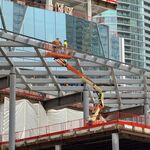AlbertC
Superstar
Will be interesting to see population movement patterns in Ontario post-Covid, especially if new initiatives like a greater focus on work from home are maintained:
COVID-19 has been the push some Canadians needed to move out of the city
Lori Ewing, The Canadian Press
Published Saturday, June 13, 2020

 www.cp24.com
www.cp24.com
COVID-19 has been the push some Canadians needed to move out of the city
Lori Ewing, The Canadian Press
Published Saturday, June 13, 2020

COVID-19 has been the push some Canadians needed to move out of the city
Lexi McKenna's work day now includes breaks to help her mother-in-law plant vegetables, which wasn't possible when she was running her wedding business at breakneck speed out of her Toronto studio.




